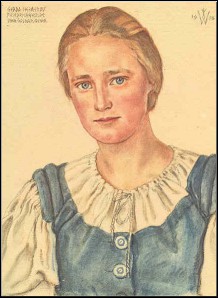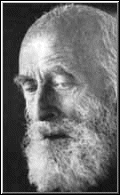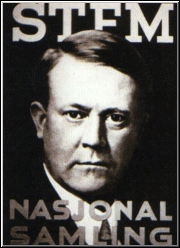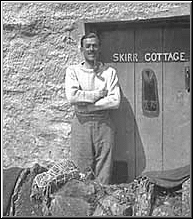From National Vanguard magazine, Issue No. 117, 1997:
Henry Williamson: Nature's Visionary
By Mark Deavin
|
The fact that the name of Henry Williamson is today so little known across the White world is a sad reflection of the extent to which Western man has allowed himself to be deprived of his culture and identity over the last 50 years. Until the Second World War Williamson was generally regarded as one of the great English Nature writers, possessing a unique ability to capture the essential essence and meaning of the natural world in all its variety and forms.
His most famous Nature book, Tarka the Otter, was published in 1927 and became one of the best-loved children's books of all time, with its vivid descriptions of animal and woodland life in the English countryside. It was publicly praised by leading English literary figures such as Thomas Hardy, Arnold Bennett, and John Galsworthy. Hardy called Tarka a "remarkable book," while Bennett declared it to be "marvelous." Even T.E. Lawrence, also known as Lawrence of Arabia, admitted that "the book did move me and gratify me profoundly."
Tarka was awarded the coveted Hawthornden Prize for literature in 1928 and eventually attracted the interest of Walt Disney, who offered a small fortune for the film rights. Williamson, however, was concerned that such an arrangement might compromise his artistic integrity, and he rejected the offer.
Seventy years later, however, Tarka, like the majority of Williamson's books, is relatively unknown and has only just become available in print again. The reason: Like several other leading European authors, Williamson was a victim of the Second World War. Not only did his naturalistic message conflict with the materialistic culture that has pervaded the Western world since 1945, but he himself was a political fighter who actively opposed the war on ideological grounds.
Born in Brockley, southeast London, in December 1895, Williamson was educated at Colfe's Grammar School, Lewisham. He spent much of his early life exploring the nearby Kent countryside, where his love of Nature and animals and his artistic awareness and sensitivity were first stimulated. Never satisfied unless he had seen things for himself, he always made sure that he studied things closely enough to get the letter as well as the spirit of reality. This enabled him to develop a microscopic observational ability which came to dominate his life.
Williamson joined the British Army at the outbreak of war in 1914 and fought at the Battle of the Somme and at Passchendaele, where he was seriously wounded. It was this experience as a frontline soldier which was the redefining moment in his life and artistic development, stimulating in him a lifelong Faustian striving to experience and comprehend the "life flow" permeating his own, and all, existence.
His spiritual development continued after the war. In 1919 he read for the first time the visionary The Story of My Heart, which was written by the English Nature writer Richard Jefferies and published in 1893. For Williamson, discovering Jefferies acted as a liberation of his consciousness, stimulating all the stored impressions of his life to return and reveal a previously smothered and overlaid self. It was not just an individual self that he discovered, however, but a racial self in which he began to recognize his existence as but a link in an eternal chain that reached back into the mists of time, and which -- if it were permitted -- would carry on forever.
 Williamson sensed this truth in his own feeling of oneness with Nature and the ancient, living, breathing Universe as represented by the life-giving sun. It also was reflected in his idea of mystical union between the eternal sunlight and the long history of the earth. For Williamson the ancient light of the sun was something "born in me" and represented the real meaning of his own existence by illuminating his ancestral past and revealing the truth of redemption through Nature. Like Jefferies before him, Williamson "came to feel the long life of the earth back in the dimmest past while the sun of the moment was warm on me ... This sunlight linked me through the ages to that past consciousness. From all the ages my soul desired to take that soul-life which had flowed through them as the sunbeams had continually found an earth." [1]
Williamson sensed this truth in his own feeling of oneness with Nature and the ancient, living, breathing Universe as represented by the life-giving sun. It also was reflected in his idea of mystical union between the eternal sunlight and the long history of the earth. For Williamson the ancient light of the sun was something "born in me" and represented the real meaning of his own existence by illuminating his ancestral past and revealing the truth of redemption through Nature. Like Jefferies before him, Williamson "came to feel the long life of the earth back in the dimmest past while the sun of the moment was warm on me ... This sunlight linked me through the ages to that past consciousness. From all the ages my soul desired to take that soul-life which had flowed through them as the sunbeams had continually found an earth." [1]
After the war Williamson became a journalist for a time while beginning work on his first novel, The Beautiful Years (1922). Finally he decided to break all contact with London and in 1922 moved to an ancient cottage in Georgham, North Devon, which had been built in the days of King John. Living alone and in hermit fashion at first, Williamson disciplined himself to study Nature with the same meticulous observations as Jefferies, tramping about the countryside and often sleeping out. The door and windows of the cottage were never closed, and his strange family of dogs and cats, gulls, buzzards, magpies, and one otter cub were free to come and go as they chose.
It was his experiences with the otter cub which stimulated Williamson to write Tarka. He had rescued it after its mother had been shot by a farmer, and he saved its life by persuading his cat to suckle it along with her kitten. Eventually the otter cub was domesticated and became Williamson's constant companion, following him around like a dog. On one walk, however, it walked into a rabbit trap, panicked, and ran off. Williamson spent years following otters' haunts in the rivers Taw and Torridge, hunting for his lost pet.
The search was in vain, but his intimate contact with the animal world gave him the inspiration for Tarka: "The eldest and biggest of the litter was a dog cub, and when he drew his first breath he was less than five inches long from his nose to where his tail joined his back-bone. His fur was soft and grey as the buds of the willow before they open up at Eastertide. He was called Tarka, which was the name given to the otters many years ago by men dwelling in hut circles on the moor. It means Little Water Wanderer, or Wandering as Water."
Williamson never attempted to pass any kind of moral judgment on Nature and described its evolutionary realities in a manner reminiscent of Jack London: "Long ago, when moose roamed in the forest at the mountain of the Two Rivers, otters had followed eels migrating from ponds and swamps to the seas. They had followed them into shallow waters; and one fierce old dog had run through the water so often that he swam, and later, in his great hunger, had put under his head to seize them so often that he dived. Other otters had imitated him. The moose are gone, and their bones lie under the sand in the soft coal which was the forest by the estuary, thousands of years ago. Yet otters have not been hunters in water long enough for the habit to become an instinct."
Williamson actually rewrote Tarka 17 times, "always and only for the sake of a greater truth." [2] Mere polishing for grace and expression or literary style did not interest him, and he strove always to illuminate a scene or incident with what he considered was authentic sunlight.
He also believed that European man could be spiritually healthy and alive to his destiny only by living in close accord with Nature. Near the end ofTarka, for instance, he delightfully describes how "a scarlet dragonfly whirred and darted over the willow snag, watched by a girl sitting on the bank ... Glancing round, she realized that she alone had seen the otter. She flushed, and hid her grey eyes with her lashes. Since childhood she had walked the Devon rivers with her father looking for flowers and the nests of birds, passing some rocks and trees as old friends, seeing a Spirit everywhere, gentle in thought to all her eyes beheld."
Williamson's sequel to Tarka was Salar the Salmon, which was also the result of many months of intimate research and observation of Nature in the English countryside. Then came The Lone Swallow, The Peregrine's Saga, Life in a Devon Village, and A Clear Water Stream, all of which, in the eyes of the English writer Naomi Lewis, displayed "a crystal intensity of observation and a compelling use of words, which exactly match the movement and life that he describes."
To Williamson himself, however, his Nature stories were not the most important part of his literary output. His greatest effort went into his two semi-autobiographical novel groups, the tetralogy collected as The Flax of Dreams , which occupied him for most of the 1920's, and the 15-volume A Chronicle of Ancient Sunlight, which began with The Dark Lantern in 1951 and ended with The Gale of the World in 1969.
Williamson's experiences during the First World War had politicized him for life. A significant catalyst in this development was the Christmas truce of 1914, when British and German frontline soldiers spontaneously left their trenches, abandoned the fighting, and openly greeted each other as brothers.
Williamson later spoke of an "incoherent sudden realization, after the fraternization of Christmas Day, that the whole war was based on lies." Another experience that consolidated this belief was when a German officer helped him remove a wounded British soldier who was draped over barbed wire on the front line. He was thus able to contrast his own wartime experiences with the vicious anti-German propaganda orchestrated by the British political establishment both during and after the war, and he was able to recognize the increasing moral bankruptcy of that establishment. In Williamson's view the fact that over half of the 338 Conservative Members of Parliament who dominated the 1918 governing coalition were company directors and financiers who had grown rich from war profits was morally wrong and detestable.
This recognition, in itself a reflection of an already highly developed sense of altruism, meant that Williamson could never be content with just isolating himself in the countryside. He had to act to try to change the world for the better. Perhaps not surprisingly he came to see in the idea of National Socialism a creed which not only represented his own philosophy of life, but which offered the chance of practical salvation for Western Civilization. He saw it as evolving directly from the almost religious transcendence which he, and thousands of soldiers of both sides, had experienced in the trenches of the First World War. This transcendence resulted in a determination that the "White Giants" of Britain and Germany would never go to war against each other again, and it rekindled a sense of racial kinship and unity of the Nordic peoples over and above separate class and national loyalties. [3]
Consequently, not only was Williamson one of the first of the "phoenix generation" to swear allegiance to Oswald Mosley and the British Union of Fascists, but he quickly came to believe that National Socialist Germany, under the leadership of Adolf Hitler, pointed the way forward for European man. Williamson identified closely with Hitler -- "the great man across the Rhine whose life symbol is the happy child," seeing him as a light-bringing phoenix risen from the chaos of European civilization in order to bring a millennium of youth to the dying Western world. [4]
Williamson visited Germany in 1935 to attend the National Socialist Congress at Nuremberg and saw there the beginnings of the "land fit for heroes" which had been falsely promised the young men of Britain during the First World War by the government's war propagandists. He was very impressed by the fact that, while the British people continued to languish in poverty and mass unemployment, National Socialism had created work for seven million unemployed, abolished begging, freed the farmers from the mortgages which had strangled production, developed laws on conservation, and, most importantly, had developed in a short period of time a deep sense of racial community. [5]
Inspired to base their lives on a religious idea, Williamson believed that the German people had been reborn with a spiritual awareness and physical quality that he himself had long sought. Everywhere he saw "faces that looked to be breathing extra oxygen; people free from mental fear." [6]
 Through the Hitler Youth movement, which brought back fond memories of his own time as a Boy Scout, he recognized "the former pallid leer of hopeless slum youth transformed into the suntan, the clear eye, the broad and easy rhythm of the poised young human being."
Through the Hitler Youth movement, which brought back fond memories of his own time as a Boy Scout, he recognized "the former pallid leer of hopeless slum youth transformed into the suntan, the clear eye, the broad and easy rhythm of the poised young human being."
In Hitler's movement Williamson identified not only an idea consistent with Nature's higher purpose to create order out of chaos, but the physical encapsulation of a striving toward Godhood. Influenced by his own lifelong striving for perfection, Williamson believed that the National Socialists represented "a race that moves on the poles of mystic, sensual delight. Every gesture is a gesture from the blood, every expression a symbolic utterance ... Everything is of the blood, of the senses." [7]
Williamson always believed that any spiritual improvement could only take place as a result of a physical improvement, and, like his mentor Richard Jefferies, he was a firm advocate of race improvement through eugenics. He himself was eventually to father seven children, and he decried the increasing lack of racial quality in the mass of the White population. He urged that "the physical ideal must be kept steadily in view" and called for the enforcement of a discipline and system along the lines of ancient Sparta in order to realize it. [8]
In 1936 Williamson and his family moved to Norfolk, where he threw himself into a new life as a farmer, the first three years of which are described in The Story of a Norfolk Farm (1941). But with the Jews increasingly using England as a base from which to agitate for war against Germany, Williamson remained very active through his membership in the British Union of Fascists in promoting the idea of Anglo-German friendship. Until it was banned in 1940, Williamson wrote eight articles for the party newspaper Action and had 13 extracts reprinted from his book The Patriot's Progress. He called consistently for Hitler to be given "that amity he so deserved from England," so as to prevent another brothers' war that would see the victory only of Asiatic Bolshevism and the enslavement of Europe. On September 24, 1939, for instance, he wrote of his continuing conviction that Hitler was "determined to do and create what is right. He is fighting evil. He is fighting for the future."
Williamson viewed the declaration of war on Germany by Britain and France as a spiteful act of an alien system that was determined to destroy the prospect of a reborn and regenerated European youth. And his continued opposition to it led to his arrest and internment in June 1940, along with Mosley and hundreds of others. His subsequent release on parole was conditional upon his taking no further action to oppose the war. Silently, however, Williamson remained true to his convictions. Visiting London in January 1944, he observed with satisfaction that the ugliness and immorality represented by its financial and banking sector had been "relieved a little by a catharsis of high explosive" and somewhat "purified by fire."
National Socialism's wartime defeat, however, dealt Williamson a heavy blow. Decrying the death struggle of "the European cousin nations" he lamented that "the hopes that have animated or agitated my living during the past thirty years and four months are dead." [9]
Consequently, his first marriage broke up in 1947, and he returned to North Devon to live in the hilltop hut which he had bought in 1928 with the prize money from Tarka.
But it was not in Williamson's character to give up on what he knew to be true and right, and, as his most recent biographer makes clear, he never recanted his ideas about Hitler. [10]
On the contrary, he continued to publicly espouse what he believed, and he fervently contested the postwar historical record distorted by false Jewish propaganda -- even though his effort resulted, as he realized it would, in his continued literary ostracism.
In The Gale of the World, the last book of his Chronicle, published in 1969, Williamson has his main character Phillip Maddison question the moral and legal validity of the Nuremberg Trials. Among other things, he muses why the Allied officers who ordered the mass fire bombing of Germany, and the Soviet generals who ordered the mass rape and mass murder during the battle for Berlin, were not on trial; and whether it would ever be learned that the art treasures found in German salt mines were put there purely to be out of the way of the Allied bombing. He also questions the official view of the so called "Holocaust," stating his belief that rather than being the result of a mass extermination plan, the deaths in German concentration camps were actually caused by typhus brought about by the destruction of all public utility systems by Allied bombing.
In the book Williamson also reiterates his belief that Adolf Hitler was never the real enemy of Britain. And in one scene Phillip Maddison, in conversation with his girl friend Laura, questions whether it was Hitler's essential goodness and righteousness that was responsible for his downfall in the midst of evil and barbarity:
Laura: I have a photograph of Hitler with the last of his faithful boys outside the bunker in Berlin. He looks worn out, but he is so gentle and kind to those twelve- and thirteen-year-old boys.Phillip: Too gentle and kind Laura ... Now the faithful will be hanged.
Williamson also remained loyal in the realm of political ideas and action. When Oswald Mosley had returned to public life in Britain in 1948 by launching the Union Movement, Williamson was one of the first to give his support for an idea which he had long espoused: the unity of Western man. Contributing an article to the first issue of the movement's magazine, The European, he called for the development of a new type of European man with a set of spiritual values that were in tune with himself and Nature.
Such positive and life-promoting thinking did not endear Williamson to the powers that be in the grey and increasingly decadent cultural climate of post-Second World War Britain. His books were ignored, and his artistic achievement remained unrecognized, with even the degrees committee at the university to which he was a benefactor twice vetoing a proposal to award him an honorary doctorate. The evidence suggests, in fact, that Williamson was subject to a prolonged campaign of literary ostracism by people inside the British establishment who believed he should be punished for his political opinions.
For Williamson, however, the machinations of trivial people in a trivial age were irrelevant; what was important was that he remained true in the eyes of posterity to himself, his ancestors, and the eternal truth which he recognized and lived by. In fact, as one observer described him during these later years, he remained a "lean, vibrant, almost quivering man with ... blazing eyes, possessing an exceptional presence [and a] ... continued outspoken admiration for Hitler ... as a 'great and good man.'" [11]
Certainly, Williamson knew himself, and he knew what was necessary for Western man to find himself again and to fulfill his destiny. In The Gale of the World he cited Richard Jefferies to emphasize that higher knowledge by which he led his life and by which he was convinced future generations would have to lead their lives in order to attain the heights that Nature demanded of them: "All the experience of the greatest city in the world could not withhold me. I rejected it wholly. I stood bare-headed in the sun, in the presence of earth and air, in the presence of the immense forces of the Universe. I demand that which will make me more perfect now this hour."
Henry Williamson's artistic legacy must endure because, as one admirer pondered in his final years, his visionary spirit and striving "came close to holding the key to life itself."
He died on August 13, 1977, aged 81.
Notes
1. Ann Williamson, Henry Williamson: Tarka and the Last Romantic, (London, 1995), 65.
2. Eleanor Graham, "Introduction" to the Penguin edition of Tarka the Otter (1985).
3. Higginbottom, Intellectuals and British Fascism , (London, 1992), 10.
4. Henry Williamson, The Flax of Dreams (London, 1936) and The Phoenix Generation (London, 1961).
5. Henry Williamson, A Solitary War (London, 1966).
6. Higginbotham, op. cit., 41-42.
7. J. W. Blench, Henry Williamson and the Romantic Appeal of Fascism , (Durham, 1988).
8. Henry Williamson, The Children of Shallow Ford, (London, 1939).
9. Higginbotham, op. cit., 49.
10. Ann Williamson, op. cit., 195.
11. Higginbotham, op. cit., 53.









